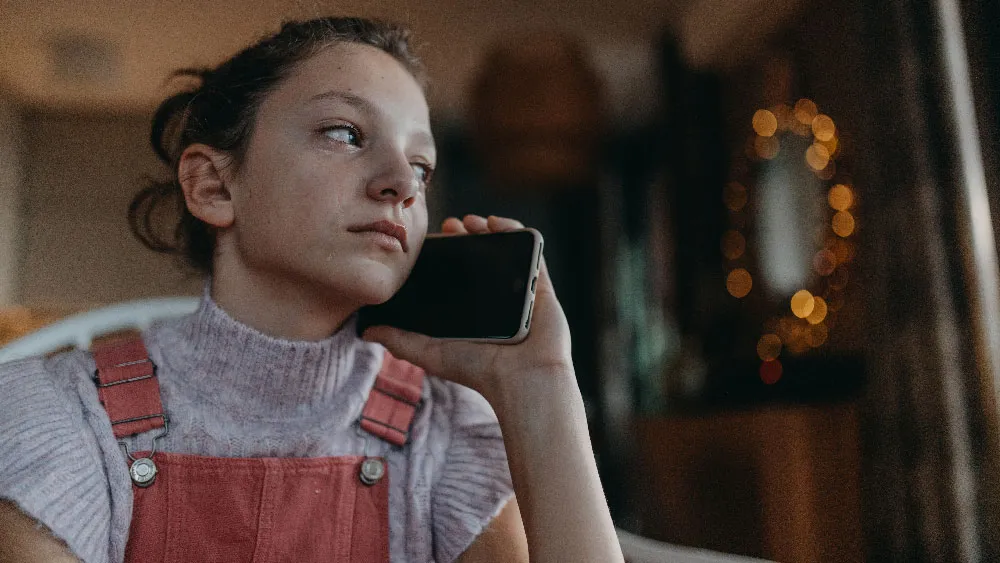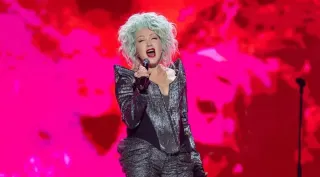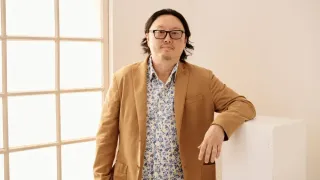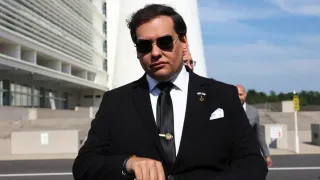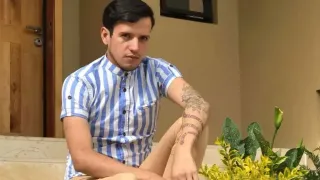July 26, 2015
To Protest and Serve: Gay NYC Councilmember Corey Johnson
Winnie McCroy READ TIME: 7 MIN.
With his baby face and love of plaid shirts, few would guess that 32-year-old Corey Johnson is on track to becoming one of the most powerful men in New York City. But this former high school football captain made waves coming out to his teammates, and then to his neighbors as chair of Community Board 4.
He parlayed his inclination for community service into a successful win as New York City council member serving the 3rd District, which encompasses several of the city's gayborhoods, including the West Village, Chelsea and Hell's Kitchen.
Now Johnson is chalking up wins left and right -- from providing healthy fruits and vegetables to local families, to fighting for affordable housing for all New Yorkers, even going as far as getting arrested during a civil disobedience protest outside Governor Andrew Cuomo's office.
It's anyone's guess what Johnson will do next, but one thing is certain: this politically motivated young man has a promising future.
EDGE: You first garnered media attention in 2000, when you came out as gay while you were captain of your football team at Masconomet Regional High School. What prompted this revelation, and how did it change life for you?
Johnson: It changed everything. Before I came out, I was depressed and despondent. I knew that I had to tell the truth about who I was. When I came out to my team, I was afraid of how they were going to react. But you know what they said? They said all that matters to us is that you can play football. At the time, it was highly unusual for a high school football player to come out. So it made the front page of the New York Times. I traveled the country, sharing my story with other LGBTQ youth. From then on, I was an activist.
EDGE: You spent some time in the real estate industry, and then served as political editor for Towleroad. Did you always have an interest in politics, or did this spawn that interest?
Johnson: I first came to New York City for an event by the Hetrick-Martin Institute, an organization that provides services to LGBTQ youth. A weekend turned into a week, a week turned into two weeks -- and I never left. I immediately became involved in local progressive politics, working on the campaigns of candidates like Carl McCall and Mark Green. I moved to Chelsea and fell in love with the neighborhood.
�
EDGE: Following this, you served as chair of Community Board 4, leading them in issues ranging from education to affordable housing. What was your biggest accomplishment during that time?
Johnson: I was chair of CB4 during a period of profound change on the West Side. We devoted a lot of our time to ensuring that the growth was responsible and respectful of the people, character and history of our neighborhoods. Hundreds of units of affordable housing were built, and I'm proud to have been able to play a role in that.
�
EDGE: You also continue to be invested in issues of affordable housing. You participated in a rally against a shady landlord on West 26th Street, and more recently was arrested for a civil disobedience charge by protesting the governor's office over this issue. Why is housing an issue for which you're willing to go to the mat?
Johnson: The rent laws are up for renewal. There are 1 million rent-stabilized apartments in New York City, housing nearly 2.5 million people. These laws are literally the only thing keeping our neighborhoods affordable to middle- and working-class people. We're losing tens of thousands of these units a year due to loopholes in the laws that allow affordable units to be removed from the program. So we demanded that the governor fight to strengthen the laws. If the laws aren't renewed and strengthened, we're not going to keep New York City affordable, and we'll lose the diversity that defines us.
EDGE: You're now council member for New York City's District 3, covering the West Village, Chelsea and Hell's Kitchen, the gayest neighborhoods in town. What's it like to work so directly for your community?
Johnson: It's an honor and a privilege to serve my community in the City Council, particularly in a district with one of the largest and most historic LGBT communities in the world. I've been able to work actively on LGBT and HIV/AIDS issues. Working on issues that so deeply and personally impact my community�is a very special opportunity.
EDGE: Unlike some elected officials, you're willing to put yourself on the line to protect New York's transgender community.
Johnson: My proudest accomplishment on behalf of the transgender community while I've been in office is the passage of birth certificate legislation, which now allows New Yorkers to correct the gender marker on their birth certificate without undergoing surgery. The previous policy was outdated and discriminatory, involving invasive and expensive surgical requirements. A birth certificate is a key piece of identification, and not being able to correct it was really negatively impacting the lives of transgender New Yorkers. We got those bad policies off the books, and I'm extremely proud of that.
EDGE: We're also right in the middle of Pride celebrations in NYC. What does Pride mean to you, and how will you [did you] celebrate it?
Johnson: Pride is a very special time to me. It's a time for us to celebrate the tremendous progress we've made. If you look back just a few years, we've come a long way. So we take a pause and celebrate these victories. It's also a time to look forward to the progress we still have to make, and to battles ahead. We commemorate Pride at the City Council in the council chambers, and this year we were joined by George Takei. The LGBT Caucus marches in Queens Pride, Brooklyn Pride; in Staten Island, the Bronx and, of course, Manhattan. We have a great time!
EDGE: You've also worked with the NYC Landmarks Preservation Commission to consider preserving the Stonewall Inn. Why is this so important for our community?
Johnson: When I first visited New York City, the first place I wanted to go was the Stonewall Inn. I stood outside and felt a deep connection to this place that I had read and heard so much about. To now be the council member representing the West Village and to have a chance to vote on its landmark designation is incredibly meaningful and special. I really hope to see other sites of historical significance to the LGBT community landmarked so that future generations can also experience a connection to their history and heritage.
EDGE: You've also helped the LGBT community by ensuring housing for New Yorkers living with HIV, and for additional beds for homeless youth. Is the LGBT community forgetting our most vulnerable in our rush to secure marriage?
Johnson: Securing marriage equality in all 50 states is an incredibly important goal (and I hope we'll be able to celebrate that this month)! But it's important to remember that even if we're victorious on that front, there is a lot of work left to be done, and there are a lot of people being left behind. I think most people understand that. The fact that so many young people are without shelter every night is a scandal. Approximately 40 percent of them are LGBTQ.
New Yorkers with HIV are also too often left homeless, unable to take their medication on a schedule or maintain a healthy lifestyle. As a result, they become sicker and their viral loads increase. This has really stymied our efforts against HIV/AIDS, so I have put forward legislation that would allow people with HIV to access the benefits available to people with AIDS.�
EDGE: You're also an outspoken advocate against animal abuses. Tell EDGE readers about your puppy love!
�
Johnson:�I believe we have a responsibility to defend those who cannot defend themselves, and this includes animals. As chair of the council's Health Committee, I've passed laws regulating irresponsible breeders and ensuring that city pet stores do not obtain puppies from unethical�"puppy mills." I've passed bills to keep animals out of the hands of abusive owners by creating standards that potential owners must meet before obtaining a new pet, and require New York City pet shops to disclose information about the origins of the animals they sell. I've put forward legislation that would require sprinklers to be installed in pet stores. These bills will save the lives of untold numbers of cats and dogs.
EDGE: This is an awful lot to have accomplished, but you're only in your early 30s. What are your goals for the next five years?
Johnson:First and foremost, I want to be known as a great council member who went to bat for his constituents and who was able to get things done. My district has a lot of challenges, with development pressure coming from all sides and the price of real estate soaring higher than we ever thought we'd see. We need to make sure that the West Side retains the qualities that make it special, particularly its economically and culturally diverse population. Rising inequality is a very real threat to our city, and it's up to us, now, to take a stand.
Winnie McCroy is the Women on the EDGE Editor, HIV/Health Editor, and Assistant Entertainment Editor for EDGE Media Network, handling all women's news, HIV health stories and theater reviews throughout the U.S. She has contributed to other publications, including The Village Voice, Gay City News, Chelsea Now and The Advocate, and lives in Brooklyn, New York.
